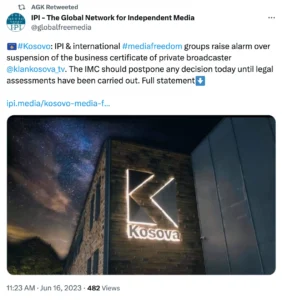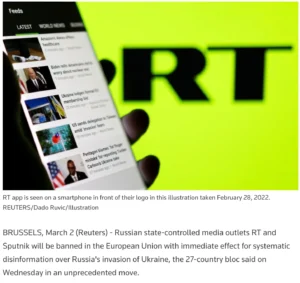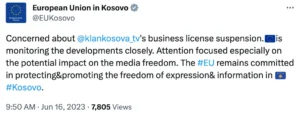In the realm of media, where truth is paramount, the line between press freedom and responsible journalism can become blurred. The case of KLAN Kosova, a media outlet exposed for spreading fake news and propaganda, serves as a stark reminder of the delicate balance between upholding freedom of the press and safeguarding the integrity of information. While defenders of press freedom may argue for the protection of outlets like KLAN Kosova, conveniently turning a blind eye to its involvement in misinformation, a more critical examination reveals a disheartening truth.
The European Parliament report, “Mapping Fake News and Disinformation in the Western Balkans and Identifying Ways to Effectively Counter Them,” serves as a compass for navigating the murky waters of disinformation campaigns. It explicitly highlights KLAN Kosova as a notorious purveyor of fake news and disinformation engaged in a calculated assault on Kosovo’s statehood, relations with Europe, and internal stability. Core narratives employed by such outlets include labelling Kosovo as a mafia state, fabricating threats against ethnic minorities, and insinuating that the nation cannot govern itself without Serbia’s support.
To compound the issue, recent revelations by Kosova News have cast an even darker shadow over KLAN Kosova. It has come to light that the outlet was registered in Serbia and financed by Serbian sources, effectively transforming it into a national security concern for Kosovo. The implications of a media organization disseminating misinformation with ties to an adversarial state like Serbia cannot be ignored. The very fabric of societal stability, democratic processes, and national security is threatened by such machinations.
 Yet, amidst this critical moment, some press freedom guardian organizations choose to rally behind KLAN Kosova, seemingly ignoring its well-documented involvement in spreading falsehoods. This willful ignorance jeopardizes their credibility and the trust placed in them.
Yet, amidst this critical moment, some press freedom guardian organizations choose to rally behind KLAN Kosova, seemingly ignoring its well-documented involvement in spreading falsehoods. This willful ignorance jeopardizes their credibility and the trust placed in them.
While these organizations are entrusted with the noble mission of upholding press freedom, it is crucial that they exercise due diligence in assessing the outlets they support. By defending a media outlet known for propagating fake news, they undermine their own cause and call into question their commitment to responsible journalism.
One must question the motivations of those who advocate for KLAN Kosova’s protection, despite its demonstrated involvement in disinformation campaigns. The credibility of press freedom guardians hangs in the balance, as they stand accused of compromising their values in favour of ideological allegiance. In the Western Balkans, where deep-rooted tensions persist, a failure to address the disinformation ecosystem fosters an environment where truth becomes elusive, and stability is constantly threatened.

The European Union’s reaction, standing in support of KLAN Kosova and expressing concerns over its business license suspension, is a glaring display of hypocrisy. While the EU claims to prioritize media freedom, its double standards are evident in its own actions.
It is astonishing to witness the EU closely monitoring developments and emphasising the potential impact on media freedom in Kosovo, while conveniently disregarding its own ban on Russia Today and Sputnik operating within European borders. This blatant contradiction exposes the EU’s selective approach to press freedom, raising serious doubts about its commitment to protecting and promoting freedom of expression and information. Such inconsistencies undermine the EU’s credibility and cast a shadow of suspicion on its true intentions in the realm of media governance.
 In the pursuit of truth and transparency, the responsibility must extend beyond media outlets themselves. The global community should take note of the role played by US Embassies in Kosovo and Serbia, whose actions inadvertently appease and enable Serbia’s agenda. The presence of figures like DAS Envoy Gabriel Escobar, whose wife’s art fairs are sponsored by the Serbian government, raises concerns about conflicts of interest and impartiality. Likewise, the revelation that US Secretary Antony Blinken owns and operates a $10 million hedge fund raises questions about potential conflicts between personal interests and his official responsibilities.
In the pursuit of truth and transparency, the responsibility must extend beyond media outlets themselves. The global community should take note of the role played by US Embassies in Kosovo and Serbia, whose actions inadvertently appease and enable Serbia’s agenda. The presence of figures like DAS Envoy Gabriel Escobar, whose wife’s art fairs are sponsored by the Serbian government, raises concerns about conflicts of interest and impartiality. Likewise, the revelation that US Secretary Antony Blinken owns and operates a $10 million hedge fund raises questions about potential conflicts between personal interests and his official responsibilities.
The battle against disinformation requires a united front, with press freedom advocates, governments, and citizens working in unison to counter this corrosive threat. It necessitates the recognition that defending outlets such as KLAN Kosova, steeped in misinformation and propaganda, undermines the very credibility of those championing press freedom. As the wolves attempt to hide among the sheep, it is the responsibility of society to unmask them and uphold the fundamental principles of truth, integrity, and responsible journalism. Only then can the tide of disinformation be stemmed, and a path towards a more informed and stable future be forged.
The Perils of Defending Misinformation in the Name of Press Freedom
By defending outlets like KLAN Kosova, press freedom guardians unwittingly provide ammunition to those who wish to undermine the credibility of legitimate journalism. The consequences of such actions are far-reaching, as they erode public trust in the media and compromise the very essence of democracy. Press freedom is a cherished principle, but it is not absolute. It must be exercised responsibly, with an unwavering commitment to truth and the public interest.
However, the struggle against disinformation cannot be waged by press freedom organizations alone. Governments, policymakers, and civil society also bear the responsibility of establishing robust frameworks to counteract the spread of fake news and propaganda. Collaboration between these stakeholders is crucial in developing comprehensive strategies that address the root causes of disinformation, promote media literacy, and ensure the dissemination of accurate and reliable information.
In the case of Kosovo, it is essential to recognize the geopolitical context within which disinformation campaigns operate. Serbia, a country with a history of territorial aggression and contentious relations with Kosovo, has been implicated in supporting and financing outlets like KLAN Kosova. The implications of such involvement cannot be ignored, as they pose a significant threat to the stability and security of the region.
To combat this multifaceted challenge effectively, international cooperation is imperative. Countries must work together to share best practices, exchange intelligence, and coordinate efforts to dismantle disinformation networks. It is vital to develop mechanisms for early detection and rapid response to emerging disinformation campaigns, ensuring that accurate information reaches the public in a timely manner.
Moreover, in the pursuit of countering disinformation, it is essential to foster an informed and discerning citizenry. Media literacy programs should be implemented to equip individuals with the critical thinking skills necessary to evaluate information sources, recognize manipulative tactics, and distinguish between fact and fiction. By empowering citizens to become active participants in the information ecosystem, we can collectively build resilience against the spread of disinformation.
The battle against disinformation is a complex and ongoing struggle, one that requires a multifaceted approach and unwavering commitment from all stakeholders. Press freedom guardians must take a critical stance and recognise that defending outlets engaged in misinformation compromises their own credibility and undermines the very principles they seek to uphold. By upholding the truth, fostering international cooperation, and empowering individuals, we can confront the disinformation epidemic head-on and pave the way for a more informed, resilient, and democratic future.

